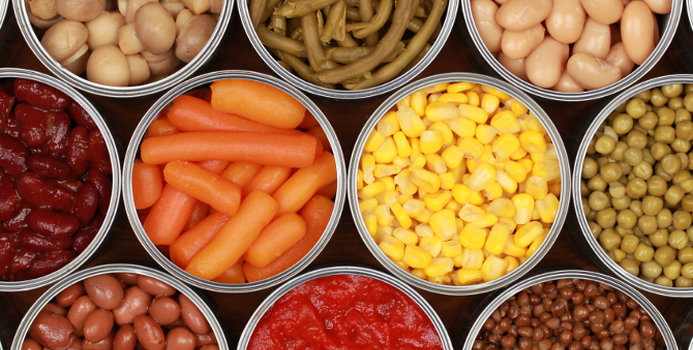For convenience, coming home after a tough day's work, throwing your briefcase on the chair and opening up canned vegetables to cook in the pan with some other quick-cooking ingredients seems just great. Canned vegetables may not be such a great idea, though. Consider the following three reasons to ditch the cans and opt for frozen or fresh vegetables instead.
1. Bisphenol A (BPA)Bisphenol A worries health practitioners because of its possible link to serious health problems. BPA is an industrial compound, but food manufacturers use BPA to protect food from metal corrosion and bacteria. BPA may affect neural development in fetuses. BPA is also linked to endocrine disorders, heart disease and cancer. Canned foods have high amounts of BPA that some study groups find unacceptable.
One group of scientists discovered levels of BPAs in canned foods that were 200 times the level proclaimed by the U.S. government as safe. Research also shows that BPA leaches from the liner into the food of canned goods. In a study's random sampling of 50 cans from the U.S. and Canada, researchers found BPA in 46 of the 50 food products. The highest level was found in a can of green beans.
2. SodiumYou need not worry about the sodium content of fresh vegetables, but canned vegetables pose a sodium risk if you are on a low-salt diet for health reasons. Check the ingredients of canned vegetables because they carry high levels of sodium. Fortunately, food manufacturers, in response to consumer awareness about sodium, have responded with reduced-sodium varieties. Unfortunately, not all canned vegetable products have low-sodium versions that you can find easily in stores.
One state health agency concerned about the amount of sodium in commercial food took a look at canned tomatoes to illustrate the difference. The agency found that regular canned tomatoes had 15 times as much sodium as reduced-sodium canned tomatoes. Still, you can salvage your cans of vegetables by rinsing the food from the can first in water before putting the veggies in the pot, oven, pan or microwave. That will remove some of the salt content.
3. SulfitesSulfites are sulfur-based compounds added to food as preservatives. They are found in canned vegetables. About one out of 100 people is sensitive to sulfites, and reactions can be deadly. Sensitivity varies from person to person, but the reaction manifests itself in respiratory problems. Signs of a bad reaction develop in just 15 minutes to a half-hour after eating foods with sulfites.They take the form of shortness of breath or wheezing.
Food labels on canned vegetables may not say "sulfites" per se, but look for any of these ingredients which have sulfites in them: sulfur dioxide, potassium bisulfite, potassium metabisulfite or sodium sulfite.
Although these are three strong reasons to avoid canned vegetables, vegetables in general are the right choice for healthy eating. The perspective recommended by nutritionists is easy to live by: choose fresh or frozen vegetables first and canned vegetables second. A university study found that fiber and key vitamins in vegetables that underwent the canning process were not compromised as a result of canning. Just limit your use of canned vegetables if you are concerned about BPA, and look for reduced-sodium choices too.



